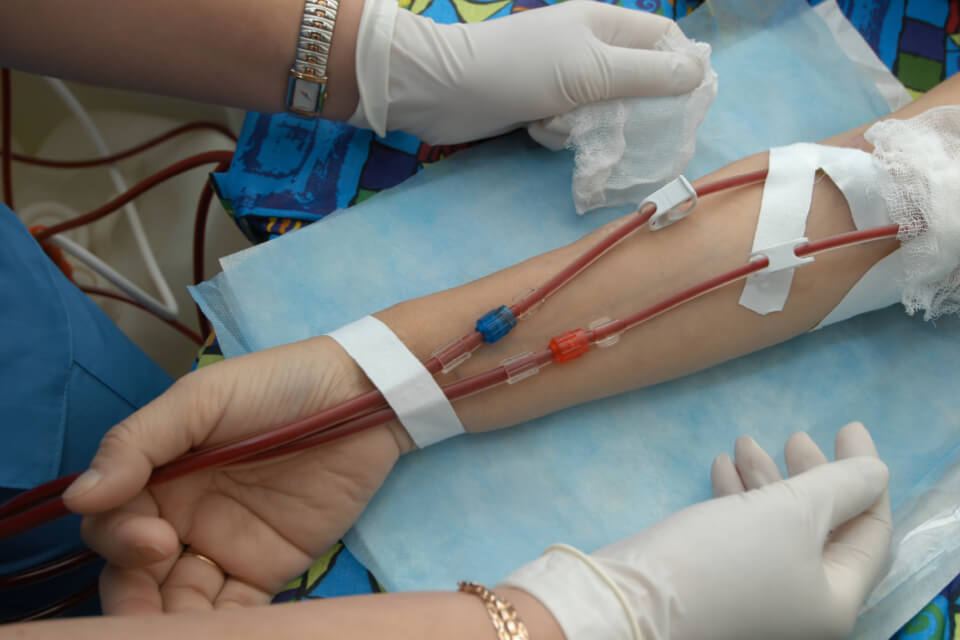What to Know
The best way for the over half a million people in the United States who suffer from kidney failure to receive lifesaving hemodialysis is through an arteriovenous fistula (AVF), which is a connection made between an artery and vein. Traditionally, open surgery (with larger incisions and longer recovery) has been the only method of creating an AVF, until Ellipsys Endo AVF became available at Richmond Vascular Center. Ellipsys Endo AVF is an innovative and FDA-approved non-surgical option for creating an AVF that is minimally invasive. With a high rate of success and reduced complications, Ellipsys is a safe and convenient option for hemodialysis patients.
What to Expect
Prior to the Ellipsys Endo AVF procedure at Richmond Vascular Center, you will be scheduled for a consultation to evaluate if you are a candidate for the procedure. At this appointment, we will obtain a thorough medical history and perform a physical exam. You will also be asked to provide a family health history and a complete list of current medications (including dosage and frequency). We will then perform an ultrasound of your arms to evaluate if you are an appropriate candidate for AVF creation using the Ellipsys system.
Upon arrival for your Ellipsys Endo AVF, you will exchange your shirt for a gown and a trained nurse will begin an IV in the pre procedure room. If a nerve block is necessary, it will be provided at this time and completed in the procedure room prior to the fistula creation.
Next, you will lie on your back with your arm to the side as it is sterilized, draped, and numbed. The expert physician performing the procedure will enter a vein at the elbow with just a single needle stick. Using ultrasound guidance and through this tiny access site, the physician will use the Ellipsys system to connect the artery and vein together. This connection creates an AVF without the use implants or sutures. The entire procedure takes only 30 minutes. Once completed, a small bandage is placed at the treatment site. You will be returned to the pre procedure room for a brief recovery time. At discharge, you will be provided with a list of written aftercare instructions.
After 24 hours, you may return to your usual activities. Before then, follow these guidelines for post Ellipsys Endo AVF care:
- If you received medication, do not drive, use heavy machinery, make legal or financial decisions, sign important documents, drink alcohol, or take sedation medications
- Do not lift anything heavier than a two-liter bottle of soda.
- Do not wear clothing that will press against your wound.
- Relax. Do not do anything stressful.
- You may eat and drink as usual.
- If you received a nerve block, follow special discharge instructions provided.
Sharing knowledge. Empowering Patients.
How should I prepare for my Ellipsys Endo AVF procedure?
You will be provided with pre-procedure instructions. If you are not currently taking platelet medications, such as Plavix (clopidogrel) and aspirin, you may be asked to start.
Because sedation or a nerve block may be required for patient comfort during the procedure, you will be unable to drive yourself home on the day of the procedure. You must plan for a responsible adult to accompany you to the procedure, stay during the procedure, and drive you home afterwards.
Will I feel pain following my Ellipsys Endo AVF procedure?
You may have mild discomfort, swelling, and bruising at your access site.
Will I have stitches?
No. You will not have internal or external stitches, only a small bandage covering the access site.
What should I watch for after my procedure?
While complications for Ellipsys are infrequent, consult your doctor immediately if you experience any of the following:
- Worsening redness or swelling around the puncture site
- Warmth around the puncture site
- Oozing from the puncture site
- Lack of pulse or weak pulse at the puncture site
- Shortness of breath (if block was performed)
Will my insurance cover both the diagnostic tests and procedures done in the outpatient setting?
Yes. At Richmond Vascular Center, our patient-focused staff is committed to ensuring the completion of all referrals and authorizations prior to your initial visit. You will be informed if your insurance covers this procedure at your initial visit.
placeholder

From the moment I walked into the door everyone was kind, friendly and professional. Having just completed the procedure, I couldn't be happier with the outcome. I HIGHLY RECOMMEND this wonderful team.




